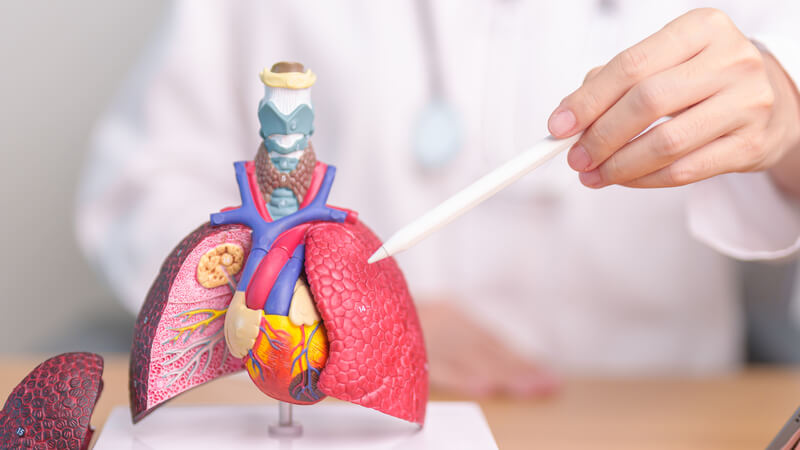Here Are Answers to Questions About These Common Lung Disorders.
 If you have breathing difficulties, it may be due to a chronic condition that causes damage to your lungs. Aside from asthma, two of the most common disorders that affect the lungs are chronic obstructive pulmonary disease (COPD) and emphysema. Wondering what the similarities and differences are between these two conditions? Here are answers to frequently asked questions about these lung diseases.
If you have breathing difficulties, it may be due to a chronic condition that causes damage to your lungs. Aside from asthma, two of the most common disorders that affect the lungs are chronic obstructive pulmonary disease (COPD) and emphysema. Wondering what the similarities and differences are between these two conditions? Here are answers to frequently asked questions about these lung diseases.
What is COPD?
Chronic obstructive pulmonary disease (COPD) refers to a group of lung diseases that result in breathing difficulties due to lung damage and limitations in airflow. The most common symptoms of COPD are frequent coughing, excessive mucus production, shortness of breath, chest tightness and wheezing. COPD is most often caused by cigarette smoking and exposure to second-hand smoke or respiratory irritants in the workplace. Many people with COPD have emphysema, which is a specific type of lung damage that falls under the COPD umbrella. Other COPD conditions include chronic bronchitis and refractory asthma.
What is emphysema?
Emphysema is a specific form of COPD characterized by progressive damage to the tiny air sacs in the lungs, called alveoli, that help you breathe. This makes it difficult to move air in and out of the lungs and pass oxygen into the bloodstream. Symptoms are similar to those of COPD, since it is a type of COPD, with the most common one being increasing breathlessness. Emphysema is most commonly caused by cigarette smoking, although exposure to smoke and respiratory irritants may also contribute to the condition. Additionally, a genetic defect called alpha-1 antitrypsin deficiency can cause emphysema to occur at an early age.
Can you have both COPD and emphysema?
Since emphysema is a type of COPD, everyone who has emphysema has COPD. However, you can have COPD without having emphysema.
When should you see a doctor?
If you have any of the following symptoms, it's a good idea to see a doctor so it can be determined if you have COPD or emphysema:
- Shortness of breath, especially if it is getting progressively worse
- A persistent cough, especially if it produces excessive mucus or phlegm
- Chest tightness or wheezing when breathing
- Frequent respiratory infections
How is COPD diagnosed?
If you have potential symptoms of COPD, a doctor will take a detailed health history and perform a physical exam. Other tests that may also be done include:
- Chest x-ray
- CT scan
- Spirometry (which measures the amount and speed of the air you blow out)
- Oximetry or arterial blood gas (which measures the oxygen in your blood)
- Lung volume test (which measures the volume of air in the lungs)
- Diffusing capacity test (which shows how easily oxygen enters the bloodstream)
- Exercise test (which can evaluate shortness of breath during exercise)
Can COPD be cured?
There is no cure for COPD, but treatment and lifestyle changes can improve symptoms and prevent further lung damage. Early diagnosis and treatment help improve your quality of life and slow the progression of the disease.
Copyright 2024 © Baldwin Publishing, Inc. Health eCooks® is a registered trademark of Baldwin Publishing, Inc. Cook eKitchen™ is a designated trademark of Baldwin Publishing, Inc. Any duplication or distribution of the information contained herein without the express approval of Baldwin Publishing, Inc. is strictly prohibited.
Date Last Reviewed: September 23, 2024
Editorial Review: Andrea Cohen, Editorial Director, Baldwin Publishing, Inc. Contact Editor
Medical Review: Perry Pitkow, MD
Learn more about Baldwin Publishing Inc. editorial policy, privacy policy, ADA compliance and sponsorship policy.
No information provided by Baldwin Publishing, Inc. in any article is a substitute for medical advice or treatment for any medical condition. Baldwin Publishing, Inc. strongly suggests that you use this information in consultation with your doctor or other health professional. Use or viewing of any Baldwin Publishing, Inc. article signifies your understanding and agreement to the disclaimer and acceptance of these terms of use.
